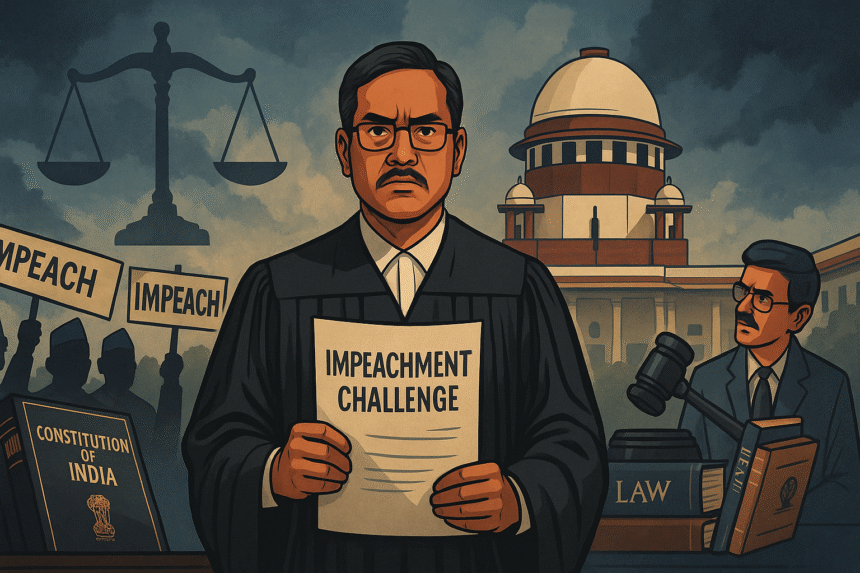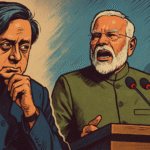“In a country where courtrooms are louder than cricket stadiums, what happens when a judge takes the system to court?”
The answer lies in the unfolding drama starring none other than Justice Yashwant Varma — a sitting judge of the Delhi High Court who just did something extremely rare (and extremely gutsy): he moved the Supreme Court against his own impeachment proceedings.
- 🧑⚖️ Who Is Justice Yashwant Varma?
- 🧨 So… Why the Impeachment in the First Place?
- 📜 What Is Judicial Impeachment in India?
- 🏛️ What Did Justice Varma Do? The Legal Twist
- 🧠 Why This Case Is So Important
- 📣 Public Reactions: Divided Like a Legal Bench
- 🧾 What Happens Next?
- 🎭 The Irony Isn’t Lost
- 🔍 What We Can Learn From Justice Yashwant Varma’s Case
- 🧠 Final Thoughts: Judging the Judge Fairly
- 📌 TL;DR (Too Long, Didn’t Read? Here’s the Verdict)
Yes, you read that right. This isn’t a courtroom scene from a Bollywood thriller. This is real-life legal theatre. And it’s packed with drama, dignity, and a dash of constitutional curiosity.
Let’s unpack what happened, why it matters, and what it says about India’s judiciary in 2025.
🧑⚖️ Who Is Justice Yashwant Varma?
Justice Yashwant Varma is no rookie. He’s a seasoned judge with a reputation for clarity, constitutional wisdom, and balanced jurisprudence. Appointed to the Delhi High Court in 2014, he has handled numerous high-profile cases, including matters of constitutional law, service disputes, and public interest litigation.
Known for being low-profile but high-impact, Justice Varma isn’t someone often seen in headlines. But now, due to Supreme Court impeachment buzz, his name is trending faster than a Netflix courtroom drama.
🧨 So… Why the Impeachment in the First Place?
According to reports, Justice Yashwant Varma was facing proceedings that could lead to his impeachment, a rare and serious disciplinary action for a sitting High Court judge.
But what were the allegations?
Here’s the twist — the full details aren’t public yet. The whispers are about administrative and procedural disagreements, not criminal conduct or gross misconduct. Some suggest the issue might be more about “judicial independence vs internal friction” rather than anything scandalous.
That makes this case even more curious. Why is someone with a clean record fighting impeachment? And why does it matter?
📜 What Is Judicial Impeachment in India?
Let’s get to basics.
Impeachment of a judge in India is governed by Article 124(4) and (5) of the Constitution for Supreme Court judges, and Article 217 read with 124 for High Court judges.
It involves:
- A motion signed by at least 100 MPs in Lok Sabha or 50 in Rajya Sabha.
- An inquiry committee set up to examine charges.
- Approval by two-thirds majority in both Houses of Parliament.
- Final presidential assent.
It’s meant to be rare, exceptional, and only for serious offenses like misbehavior or incapacity. Since independence, only one judge (Justice Soumitra Sen) has been impeached, and even that didn’t complete fully as he resigned before the vote.
Justice Yashwant Varma’s case, therefore, becomes only the second of its kind in decades to reach this stage.
🏛️ What Did Justice Varma Do? The Legal Twist
Instead of quietly waiting for the gavel to fall, Justice Yashwant Varma moved the Supreme Court — challenging the validity of the impeachment initiation itself.
He claims:
- The proceedings are unjustified.
- His constitutional rights as a judge are being violated.
- Due process under judicial ethics has not been followed properly.
He argues that judicial accountability cannot be weaponized to suppress dissent or independence within the judiciary.
Now, here’s where it gets spicy: The Supreme Court will now have to decide whether to intervene in impeachment proceedings against a High Court judge — a legal grey zone that could redefine future interpretations.
🧠 Why This Case Is So Important
This isn’t just about one judge. It’s about three big things:
1. Judicial Independence
Can a judge challenge the system without being penalized? Or does disagreement inside the judiciary equal rebellion?
2. Checks and Balances
Who checks the checkers? If internal friction leads to impeachment, where’s the line between discipline and dominance?
3. Due Process in Disciplining Judges
The Judges Inquiry Act, 1968 provides the framework. But is it being used fairly and uniformly?
In a country where justice is the last resort of the common man, it’s crucial that even judges get a fair hearing — especially from the very system they serve.
📣 Public Reactions: Divided Like a Legal Bench
As expected, opinions are flying faster than paper files in a Delhi courtroom.
- Legal experts are divided — some say Justice Varma’s move sets a dangerous precedent, others call it courageous.
- Political observers are watching closely — because let’s face it, anything involving judges and Parliament is politically radioactive.
- Twitter is on fire, obviously.
Sample post:
“So now even judges are approaching the Supreme Court for justice. #MetaJustice”
🧾 What Happens Next?
The Supreme Court will now hear Justice Yashwant Varma’s plea and decide whether:
- To quash the impeachment proceedings (big win for judicial independence)
- To stay silent and let the process continue (status quo, awkward)
- Or to recommend internal judicial mechanism improvements
Whichever way the gavel swings, this case will be a constitutional precedent for years to come.
🎭 The Irony Isn’t Lost
Think about it:
A High Court judge, trained to deliver justice, is now pleading his own case in the Supreme Court.
It’s as if a surgeon is now on the operation table, asking a fellow surgeon to double-check the diagnosis.
It’s rare. It’s bold. And it’s deeply human.
Because behind the robes and rules, judges too are individuals with rights, reputations, and resolve.
🔍 What We Can Learn From Justice Yashwant Varma’s Case
- Transparency is critical in judicial procedures — vague allegations only deepen suspicion.
- Judicial accountability must not become political — neither Parliament nor colleagues should weaponize the system.
- Judges must have recourse too — if a judge believes they’re being unfairly treated, they should have the right to fight back.
This is not just about legal power; it’s about moral courage.
🧠 Final Thoughts: Judging the Judge Fairly
The Justice Yashwant Varma impeachment challenge is not just a headline — it’s a constitutional moment.
It puts the spotlight on how we treat those who uphold the law. And how the system treats its own.
Whether the Supreme Court upholds or dismisses the plea, one thing is clear: Justice Varma has already stirred the pot and opened conversations about fairness, dignity, and the quiet pressures inside India’s judiciary.
Because sometimes, to preserve justice, even a judge must seek it.
📌 TL;DR (Too Long, Didn’t Read? Here’s the Verdict)
- Justice Yashwant Varma, Delhi High Court judge, is facing impeachment.
- He has challenged it in the Supreme Court, citing unfairness and violation of rights.
- The case is rare, complex, and could set a national precedent.
- At its heart, it’s about judicial independence, due process, and constitutional integrity.












